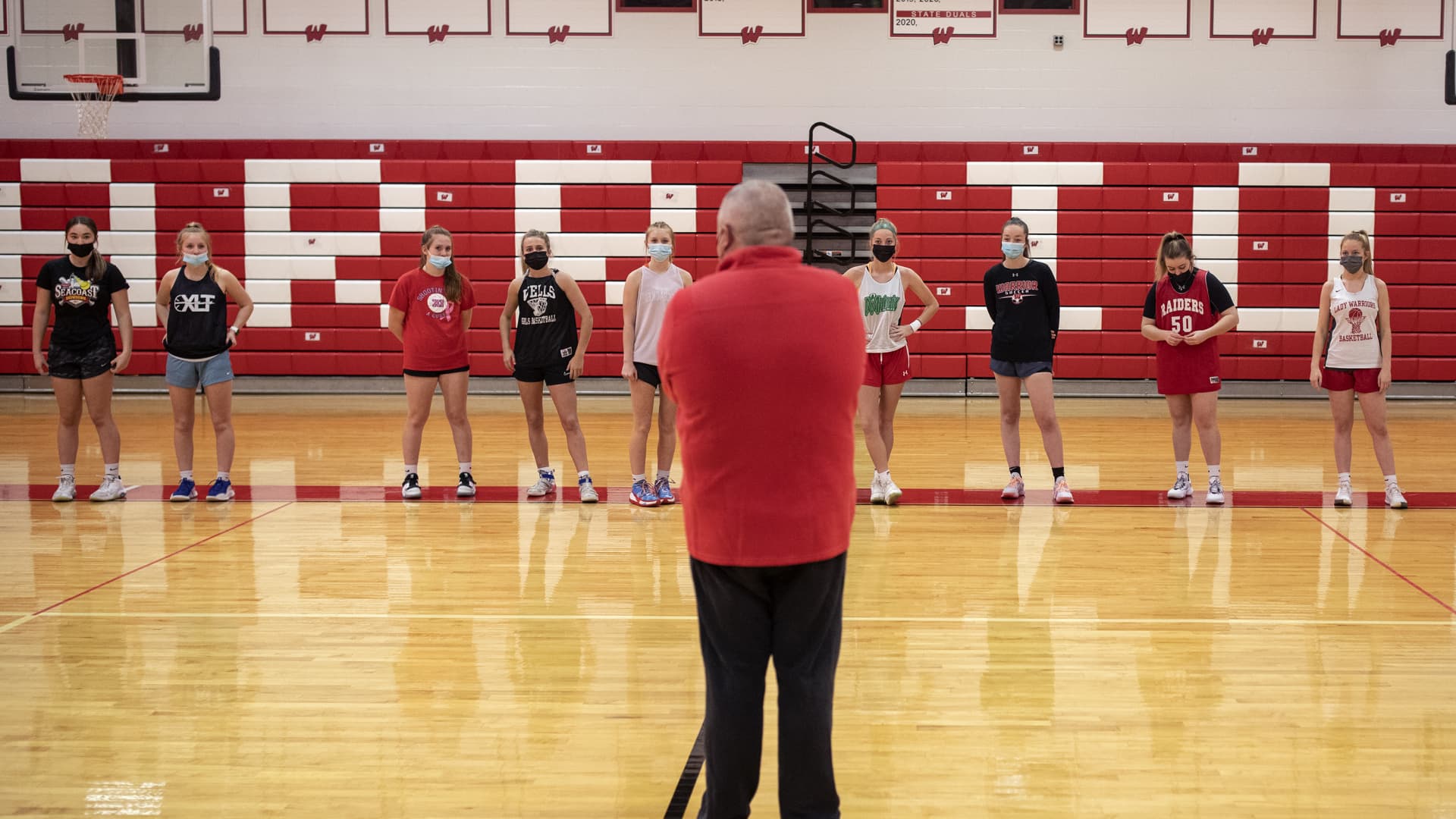Portland Press Herald | Portland Press Herald | Getty Images
In recent decades, data from sports researchers revealed an encouraging trend: young girls were participating in sports in greater numbers. But the research also uncovered a big missed opportunity. Girls drop out of sports at “alarming rates,” specifically when they hit puberty.
There is one obvious solution that sports retail giant Nike CEO John Donahoe, and many others, think can make a big difference: more female coaches.
In the historically male-dominated world of sports, girls and women have always had to fight for their right to compete and to be viewed as competitive athletes. The sexism that has prevented girls from competing in sports has also prevented women from becoming youth coaches.
“I think league administrators are kind of trained to look for dads to coach and think more often the dads are going to be the ones to step up and do it. I think sometimes they may not even be trying to recruit females,” said Mary Fry, professor and director of the University of Kansas Sport & Exercise Psychology Lab.
Nearly 75% of youth head coaches are men, according to Aspen Institute’s Project Play. Even when women are offered the opportunity to coach, they are fearful that they’re not good enough to take on such a position because of the sexist stereotypes society often promotes.
When Jen Welter, the first-ever female NFL coach and a two-time gold medalist in Olympic football, was offered the opportunity to coach football for the first time, she recalled instinctively thinking “girls don’t do that.”
“When you don’t see it, it’s really hard to say, ‘You know what, I can do that,'” Welter said.
“Most young people rarely, if ever, get the opportunity to be coached by a woman. This is a miss for all,” said Vanessa Garcia-Brito, Nike vice president, and chief social and community impact officer. “To get girls active and invite them into a lifetime of sport, they have to see it to believe it – and that starts with more female coaches.”
In March, Nike launched Coaching HER in a partnership with the University of Minnesota’s Tucker Center for Research on Girls & Women in Sport. The digital coaching resource is designed to help coaches of all genders improve their understanding of gendered bias and discrimination in sports.
Puberty changes girls’ relationship with sport
Female coaches are not just important in terms of giving young girls a positive role model – they also offer a safe space to discuss and process the difficulties that can come with a young woman’s changing body and mind. Even for girls who grew up loving sports, puberty shifts girls’ relationship with sports and very often results in them disengaging with physical activity.
The data related to this critical period in a girl’s life is clear. One in three girls participate in a sport from age 6-12, according to the Aspen Institute. But nearly one in two girls will quit sports during puberty, according to menstrual product manufacturer Always.
Research from a 2018 report by Tucker Center, Nike’s partner, gathered data globally and found that the highest rate of drop-off from girls in sports often occurs between the ages of 11 to 17, “the range when girls feel the most pressured to conform to identities shaped by their peers and adults — which includes coaches,” its report states, and it concluded that how girls feels about their coaches is a determining factor in whether they continue to play organized sports.
The Women’s Sports Foundation, created by Billie Jean King, has found that 40% of teen girls are not actively participating in a sport.
“For boys, that moving through puberty can be kind of a plus, you gain more muscle mass, and you get taller, stronger. For girls, it’s just not always the same case,” Fry said. “They’re kind of in survival mode in middle school.”
There are both physical and psychological dimensions to the problem, namely, periods and low body confidence as barriers preventing girls from continuing in sports, according to Youth Sport Trust CEO Alison Oliver. As girls’ bodies change throughout puberty, they become increasingly insecure and physical activity begins to feel different. The charity Women in Sport found that 65% of girls don’t like others watching them during sports, as it makes them feel self-conscious, vulnerable, and objectified. What’s more, seven in 10 girls avoid being active when on their period.
Coaches are critical agents that impact girls’ experiences in sports, according to the Women’s Sports Foundation, and if a girl isn’t properly supported or understood by their coach in a time as daunting as puberty, they’re going to be discouraged to compete. For example, most of the time, girls are not educated on or fitted for proper sports bras, making participating in sports painful.
“If you started to feel uncomfortable as a female athlete … it’d be pretty tough to go to a male coach about some of those things,” Welter said.
A June 2019 Nike event in London when it took over iconic recreational sports park Hackney Marshes for a football festival to celebrate the women’s game, hosting more than 1,000 women and girls, with 79 teams taking part in the tournament, across different age groups.
Kate Mcshane | Getty Images Sport | Getty Images
“These bonds that develop between a coach or a mentor and the kids is just so much bigger than just the physical activity part of it,” Fry said. “They have women in their lives they can bounce things off of, they can trust.”
Fry co-founded the Strong Girls program at the University of Kansas, where young girls are assigned a female college student as their mentor. Half of the program focuses on participating in sports together, while the other half concentrates on positive youth development. The program typically attracts girls who tend to be less athletic and creates a safe environment where they feel encouraged by female mentors to participate in sports that they normally wouldn’t pursue.
“Girls and women can’t have enough strong women in their lives. We just benefit from that,” said Fry, who is director of the program.
Female coaches were fundamental to both the success and enjoyment of sports for Christina Collins, a former youth athlete who later became a coach. “I had female coaches, as well as male, of course, and it [had] such an impact on me to realize that it was an option for me to grow up and do that. And I felt like I definitely connected with them at a deeper level than I might have [with] male coaches that I had,” said Collins, who is now a physical education and health teacher in Westchester County, and a professor in the physical education masters program at Manhattanville College.
Female coaches, she says, can offer unique insight based upon their own personal experiences as women. “[My identity] has impacted the way in which I deliver all coaching. It is meant to increase first and foremost the child’s confidence, then second, their performance ability,” said Collins, who also is founder and owner of NeverStopMoving365, a company that seeks to use sports and physical activity to promote confidence and teach life lessons.
She says this approach isn’t only benefit to girls, but extends to youth athletes of all genders, and female coaches as well.
Nike’s 20,000 female coach goal
Nike is one of the few major companies directly addressing this issue. Corporations from Target to Disney and Bank of America are being targeted for taking a stand on social issues in the current divisive political climate. Donahoe, who made his comments on the issue of girls’ sports participation rate at the recent CNBC CEO Council Summit in Santa Barbara, California, said that he believes Disney CEO Bob Iger is handling the feud with Florida Governor Ron DeSantis properly, and he pointed to Nike’s efforts in girls’ youth sports as another example of how a company can focus on social issues that are core to its values and integral to its brand.
“We’re trying to train 20,000 female coaches, moms and other former athletes to be coaches to promote youth,” Donahoe said. “So that’s less of a controversial issue, but it’s one we care about as a value,” he said.
Nike also has an aim to achieve 50% girl participation in the sport-based community programs it supports by 2025.
As a former athlete, Collins says there are lifelong benefits that come when young women and girls remain involved with sports and feel supported.
“I don’t use the actual sports as my primary form of fitness, or just the sports skills in general at all. But I pull from my toolkit of life lessons that athletics taught me,” she said.
Coaching HER encourages all coaches, regardless of gender, to give girls the chance to continue developing their character and learning life lessons from sport, and offers detailed training for coaches on how to lead girls and young women in sports.
“It’s not just women, for women. It’s women and men working together to elevate girls. That’s one of the key components. How do we work better together?” Welter said.


